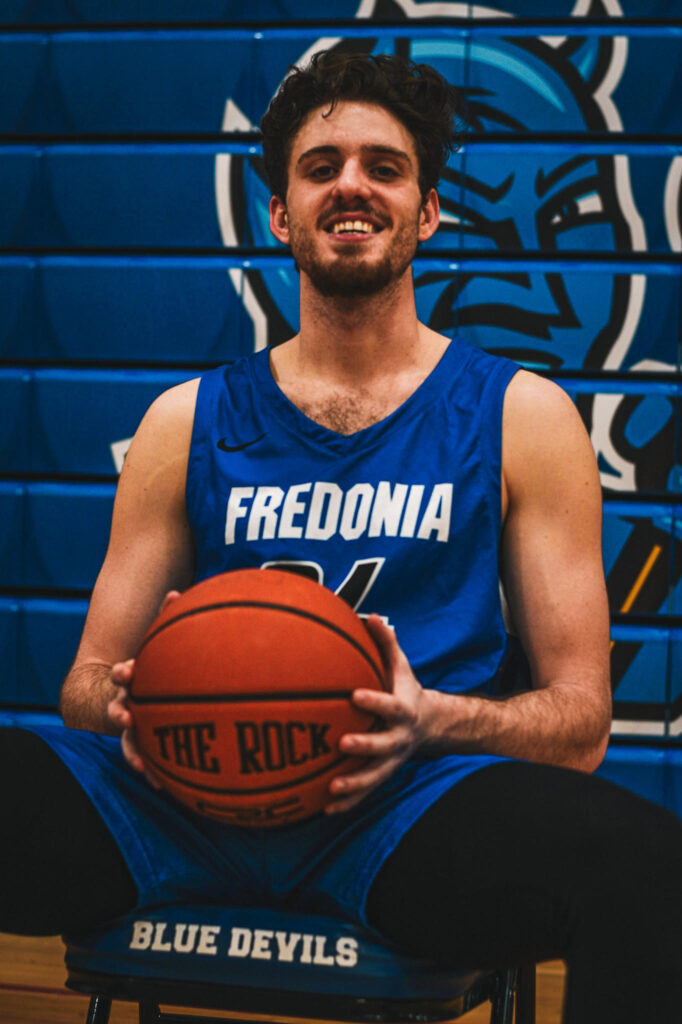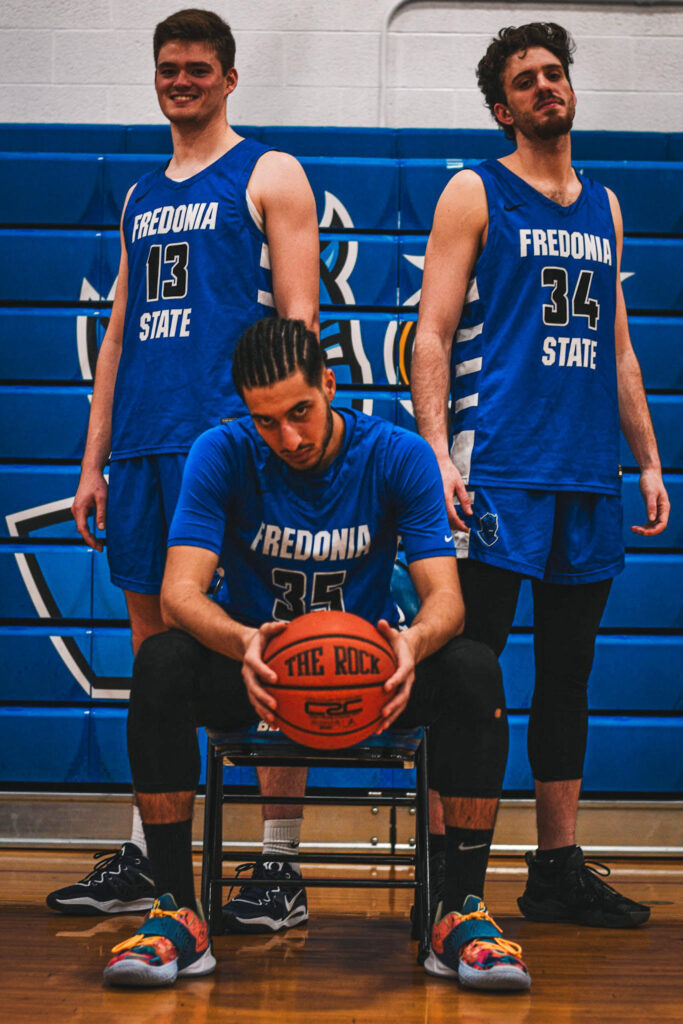WILL KARR
Life & Arts Editor
This summer, SUNY Fredonia international student Alon Haimovitz was preparing for the 2022-2023 basketball season. But, a couple years ago, Haimovitz was gearing up for something much different, nearly 6000 miles away back home in Israel, until his agent got one game-changing phone call.


“I’ve had this motto ever since that one phone call can change your life,” Haimovitz said.
The unanticipated call came from men’s basketball team head coach and former NCAA Division I basketball player Sean Smiley, inquiring if Haimovitz would be interested in possibly playing basketball for Fredonia’s team.
“I was about to join the Israeli military, and one week before, [my agent] got the phone call from coach [Smiley]. … I was not even thinking about [college] at the time. I had just graduated high school, and it was 2020 — COVID year, obviously. I didn’t know what to expect about the possibility of coming to America,” Haimovitz said. “… The only thing I was actually expecting was to not speak Hebrew.”
Haimovitz said that it took him a matter of only 20 minutes to decide that he wanted to come to America. For years, he said that he had wanted to do something different.
“My nickname back home is now ‘The American.’ It is funny to me because people here don’t see me as American, but people back home see me as American. So, I have just lost my identity,” Haimovitz said. “… People back home now see me as this successful guy that is chasing his dreams and has a clear vision of what he wants to do, but I’m just a guy in college.”
At the same time he received the call from Smiley, one of his friends back home, Alon Kremerman, was simultaneously in the process of being recruited to play for Fredonia’s basketball team after serving six years in the Israeli military. Kremerman, #34 on the team, is currently a junior applied mathematics major, and Haimovitz, #35, is a junior criminal justice major. Kremerman serves as one of the team’s captains alongside #13 Jacob Hougan.
Kremerman came to Fredonia because he wanted to play basketball while attaining a college degree. Kremerman and Haimovitz played together in a youth organization, club and semi-pro league while back in Israel.
Kremerman went to school with Haimovitz’s older sister, and Haimovitz’s mother and Kremerman’s father worked together in the Israeli Securities and Exchange Commision (SEC) back in the 1980s before the pair were born.
From red solo-cups to boisterous celebrations, Haimovitz explained how most of his perceptions of American culture and society ultimately came from the American media.
“For American people, I think it is easier to see the college experience and to see how there are a lot of options … you can be an athlete, focus on school, go to parties, be in [a] frat and do all those kinds of things,” Haimovitz said. “But coming from a place like Israel, if you actually want to go to college, your average age would probably be 26.”
In Israel, after a person graduates from high school and turns 18 years old, they are legally and constitutionally required to serve in the Israeli military, which makes it difficult for the country’s youth to continue to pursue their athletic and personal aspirations as they enter into adulthood.
In Israel, there are five different clubs and leagues: a major league, a secondary league, a third league and then two other leagues which are considered to be semi-pro.
The clubs can draft players from the different respective youth groups. However, it has become increasingly uncommon due to mandatory military service for up and coming players.
“I figured out how the youth organization structure ultimately prevents people from improving because at the end of the day, it creates some type of shell that you have until the age of 18 … but then after that you go out into the real world,” Kremerman said. “… About 40 to 50% of Israeli people get drafted. They have a process where they evaluate you, see if you are in a place to be able to go into the army and if they want to use you … it’s not your decision — you essentially hang on to their decision.”
Haimovitz explained how there are different categories for athletes in the Israeli military: active athlete, first-year athlete and elite athlete. Haimovitz said that he was supposed to be a first-year athlete, which would have allowed him to continue to play basketball, while serving at a surrounding military base as a truck driver. However, due to COVID-19, Haimovitz said that they ended up cutting the budget for the first-year program.
Meanwhile, Kremerman was drafted into the military at the age of 18. However, he was given athlete status. He continued to play semi-pro while he was in the army. During his first year in the military, he served in a central intelligence unit, where he was allowed to continue to go to practices sporadically at the beginning.
“Only if you have a contract in one of the pro leagues are you able to get a [service] waiver from the army,” Kremerman said. “However, it’s not really a waiver because you’re still a soldier, but you are considered to be an ‘athlete soldier,’ [which] essentially gives you better conditions — less time in the army and more time to go to practices and games.”
However, as Kremerman’s duties started preventing him from pursuing basketball, he transitioned into a new role as a fitness combat guide, which provided him with the ability to join a club team.
Kremerman knew that coming to America would offer him the ability to dedicate more time to basketball. Two years after Haimovitz and Kremerman played on the semi-pro team together and Kremerman finished his military service, they met in an Israeli park after a 3-on-3 basketball tournament.
“After I had committed to Fredonia, I told [Haimovitz] that he probably wasn’t going into the military and to just come with me to the U.S. to play basketball,” Kremerman said. “The same day, I sent his film to the coach who recruited him as well.”
Haimovitz and Kremerman both first came to America during the COVID-19 pandemic, which made it significantly difficult for them both to adjust to life in a new environment.
“[During] COVID, people had much more social defenses because they were kind of cautious about getting to know new people and being social. … So, we didn’t really get to know anyone on campus,” Kremerman said. “… Only since last year have we been able to have a sort of regular life.”
Haimovitz also expressed similar sentiments about coming to America.

and Alon Kremerman, #34. Photograph by Ethan Yannie.
“My GPA freshman year was [low] because I didn’t know the language and everything was on Zoom. I was just waking up in my room frustrated because I didn’t have any basketball practice and didn’t have a lot of friends,” Haimovitz said. “… But the year after COVID ended, I started making a lot of friends, and the basketball team’s chemistry developed. We started having practice and a season again — everything just changed like that.”
During his first few months on Fredonia’s campus, Haimovitz explained how he would have to translate everything that his professors were saying as he did not have a lot of other campus resources to rely on. However, Haimovitz explained that he has since become more proficient in speaking English.
Team captain Hougan explained how being a college athlete at a Division III school is different in terms of academics at the other levels. Hougan is from Chardon, Ohio and is a senior business management major. He transferred to Fredonia from Jamestown Community College in Fall 2021.
“[At D3 schools], you have to focus on your academics,” Hougan said. “If you’re at a Division I level and your team is on TV and ESPN everyday, it is a business deal for them. You are going to have personal tutors and classes catered towards your schedule, so it is basically set up for you not to fail. But here at a D3 level, you really have to take care of yourself. Like [Haimovitz] said, he didn’t have any help besides the help he gave himself.”
Haimovitz and Hougan both explained how the basketball team is working to overall strengthen their chemistry, camaraderie and brotherhood off the boundaries of the court this season, which they are hoping will translate back onto the court.
“In basketball, teamwork is everything, there are always five people on the court,” Hougan said. “It isn’t swimming, golf or boxing, where there is one person and it is all on them. It is a team sport, so you have to work with every single person on the team.”
Haimovitz went on to say how there is no “I” in the team, showing how players must work together as a collective unit instead of as lone individuals.
“We win or lose together regardless. There’s no ‘I won today.’ Instead, it’s ‘we won,’” Hougan said. “If there were five guys on the court and ten guys on the bench, we won.”
Kremerman explained how the basketball team is overall striving to find its identity this season.
“We as a team for the past two years have never had any doubt about the potential that we have to be a very great team and the potential we have as individuals to be successful basketball players,” Kremerman said. “… But we need to figure out what we need to do as a team and how we need to play to be the most successful … Hopefully we will be able to figure that out as soon as possible and get to the playoffs this year.”
